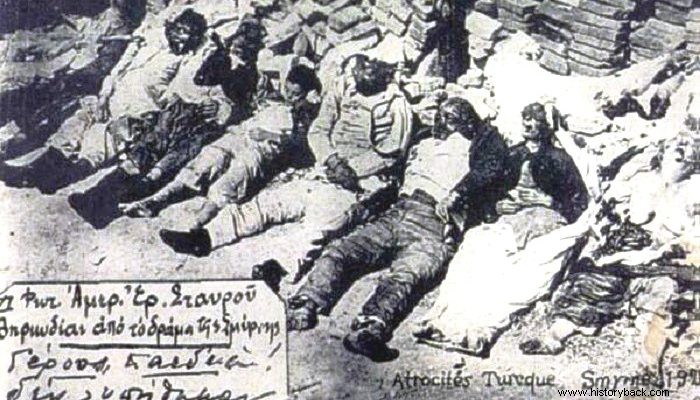
The rhetoric of the Turkish President Erdogan against Greece has been enriched this year, one hundred years since the Asia Minor Catastrophe, with the argument that the Greeks and not the Turks committed Genocide during that dramatic period. But also in Greece, some are wondering:Didn't our people commit atrocities? It is useful, therefore, to recall some facts.
OF KONSTANTINOS COLEVAS
SOURCE:PARAPOLITICS
The Genocide of the Christians of the Ottoman Empire began in 1894 with the persecution of the Armenians by Sultan Abdul Hamit II and continued during the period 1914-1922 by the regime of the Young Turks (Union and Progress Committee) and by the Government of Mustafa Kemal. All independent scholars, even serious Turkish historians, come to the conclusion that the extermination of Greeks and Armenians was a plan organized from above and implemented with the participation of the Army, Gendarmerie, local commanders, gangs of miscreants, but also ordinary Turkish citizens.
In the case of the use of violence by Greek soldiers or civilians against Turkish civilians, we have something completely different. There is no plan, no command from above. Individual Greeks did commit unacceptable and reprehensible acts. The difference, however, is that the Greek authorities in Asia Minor punished those Greeks they arrested. After all, the Greek Army went to Smyrna in May 1919 with a five-year mandate from the Paris Peace Conference. After 5 years, a referendum on the future of the Vilayet of Smyrna was planned. The Greek Administration had an interest in being gentle and friendly to the local Muslim population, who would vote in the referendum.
It is good to remember that a few days after the landing of the Greek Army in Smyrna, two Greek soldiers were executed by court-martial decision. It was an act of example, possibly severe, that sent the message that the Greek authorities punish acts of violence against local Muslims.
Israeli authors and researchers Benny Morris and Dror Ze'evi in their recent and well-documented book "The Thirty-Year Genocide, the Annihilation of Turkey's Christian Minorities (1894-1924)" present testimonies from documents of Western diplomats and missionaries of that period and conclude to the same conclusion. The Turkish leadership had planned the extermination of the Greeks and Armenians so that their country would remain purely Turkish and Muslim.
Genocide was state policy. In the case of the Greeks who committed violence, individual incidents are reported and in fact in complete contradiction to the orders they had from above. The authors record that in April 1920, three Greek "bandit leaders" were publicly hanged by order of the Commissioner-Commander of Smyrna, Aristides Stergiadis, for having committed murders of Muslim civilians.
The two Israeli authors, after exhaustive research in the documents of that time, find that many of the complaints made by the Turks about alleged crimes by Greeks turned out to be false and unfounded. They also emphasize that in the rare cases in which Christians attacked Muslims during the period 1894-1924, no Orthodox clergy participated. On the contrary, on the Turkish side there was religious fanaticism, which is why many Greeks and Armenians converted to Islam by force. History is written by the documents and not by Erdogan.
